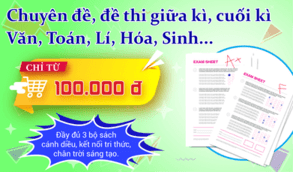150 Bài tập trắc nghiệm Tìm lỗi sai (có đáp án - cơ bản - Phần 1)
Tổng hợp câu hỏi & bài tập trắc nghiệm Tìm lỗi sai cơ bản có đáp án chi tiết giúp học sinh lớp 12 ôn luyện để chuẩn bị tốt cho kì thi Tốt nghiệp THPT môn Tiếng Anh.
150 Bài tập trắc nghiệm Tìm lỗi sai (có đáp án - cơ bản - Phần 1)
Câu 1. Developing new technologies are time-consuming and expensive.
A. developing B. technologies C. are D. time-consuming
Đáp án C sửa thành “is”
Giải thích: Chủ ngữ của câu là danh động từ (developing) nên động từ chính sẽ chia theo ngôi 3 số ít.
Câu 2. The assumption that smoking has bad effects on our health have been proved.
A. that B. effects C. on D. have been proved
Đáp án D sửa thành “has been proved”
Giải thích: Chủ ngữ của câu là “the assumption” ngôi 3 số ít nên động từ chính sẽ đi với trở động từ là “has”
Câu 3:. A novel is a story long enough to fill a complete book, in that the characters and events are usually imaginary.
A. long enough B. complete C. that D. imaginary
Đáp án C sửa thành “which”
Giải thích: Đối với mệnh đề chưa dấu phẩy, “that” không thể thay thế “which, who, whom”, và trong câu hỏi này từ được thay thế là “a complete book” nên ta dùng “which”.
Câu 4. The leader demanded from his members a serious attitude towards work, good team spirit, and that they work hard.
A. leader B. his members
C. attitude D. that they work hard
Đáp án D sửa thành “working hard”
Giải thích: Đây là kiến thức liên quan đến sự tương đương trong câu. Ta thấy 2 cụm bên trên đều là danh từ, nên cụm cuối cũng phải là danh từ.
Câu 5.The earth is the only planet with a large number of oxygen in its atmosphere.
A. the B. number C. oxygen D. its
Đáp án B sửa thành “amount”
Giải thích: The amount of + danh từ không đếm được. The number of + danh từ đếm được Trong câu hỏi này, danh từ đằng sau là “oxygen” không đếm được nên ta dùng “amount”
Câu 6. Not until he got home he realized he had forgotten to give her the present.
A. got B. he realized C. her D. the present
Đáp án B sửa thành “did he realize”
Giải thích: “Not only” đứng đầu câu nên đây là câu đảo ngữ.
Câu 7. The longer the children waited in the long queue, the more impatiently they became
A. the longer B. waited C. the long queue D. impatiently
Đáp án D sửa thành “impatient”
Giải thích: “become” là một động từ đặc biệt mà đi cùng nó là tính từ với nghĩa trở nên làm sao đó. Ví dụ: become impatient = trở nên mất bình tĩnh
Câu 8. Mrs. Stevens, along with her cousins from Canada, are planning to attend the firework display in Da Nang, Vietnam.
A. with B. her cousins C. are D. to attend
Đáp án C sửa thành “is”
Giải thích: Cấu trúc S1 + along with + S2 + V (chia theo S1). Trong câu hỏi này chủ ngữ là Mrs. Stevens (ngôi 3 số ít) nên động từ tobe là “is”.
Câu 9. If one type of manufacturing expands, it is like that another type will shrink considerably.
A. expands B. like C. another D. considerably
Đáp án B sửa thành “likely”
Giải thích: Cấu trúc It + tobe + likely + that + clause (có xu hướng …)
Câu 10. For thousands of years, man has created sweet-smelling substances from wood, herbs and flowers and using them for perfumes or medicine.
A. man B. sweet-smelling C. using them D. orĐáp án C sửa thành “used them”
Giải thích: Đây là kiến thức về sự tương đương trong câu, dấu hiệu là “and”. Động từ trước là “created” nên đằng sau cũng là Ved.
Câu 11. People in every part of the world readily and easily communicates by means of electronic mail.
A. every part B. readlily C. communicates D. by means
Đáp án C sửa thành “communicate”
Giải thích: Chủ ngữ là “people” nên động từ không cần thêm “s”.
Câu 12. The grass needs cutting, so let us have one of the men to take lawn-mower and do it.
A. needs B. cutting C. let D. to take
Đáp án D
Giải thích: Cấu trúc have + sb + Vinf (nhờ ai đó làm gì)
Câu 13. . What we know about certain diseases are still not sufficient to prevent them from spreading easily among the population.
A. What we know B. are C. from spreading D. among
Đáp án B thành “is”
Giải thích: Chủ ngữ của câu là “What we know …” (ngôi 3 số ít) nên tobe là “is”
Câu 14.By the time Robert will finish writing the first draft of his paper, most of the other students will have completed their final draft
A. will finish B. writing C. most D. their
Đáp án A thành “finishes”
Giải thích: By the time + hiện tại đơn, tương lai (đơn/ hoàn thành/ tiếp diễn). Câu này dịch như sau: Đến khi Robert hoàn thành bản thảo đầu tiên thì hầu hết những học sinh khác đã hoàn thành bản thảo cuối cùng của mình
Câu 15. Each of the beautiful cars in the shop was quickly sold to their owner
A. Each B. cars C. quickly D. their
Đáp án D thành “its”
Giải thích: Chủ ngữ là “each of …” nên dùng “its”
Câu 16. . United States is aimed at develop friendly relations among nations based on respect for the principle of equal rights and self-determination of people.
A. develop B. based C. principle D. people
Đáp án A sửa thành “developing”
Giải thích: aim at + N hoặc một cách ngắn gọn là sau giới từ phải là danh từ.
Câu 17. After spending two days arguing about where to go for their holidays, is was decided that they shouldn’t go anywhere.
A. arguing B. for C. is was decided D. shouldn’t go
Đáp án C sửa thành “they decided”
Giải thích: Câu này cả 2 vế đều chung một chủ ngữ là “they” (vì vế 1 rút gọn chủ ngữ ở dạng chủ động nên ta có thể suy ra điều đó).
Câu 18. Regarding as one of the leading figures in the development of the short story, O Henry is the author of many well- known American novels.
A. Regarding as B. leading figures C. the D. novels
Đáp án A sửa thành “regarded as”
Giải thích: Câu này thực chất cả 2 vế đều chung một chủ ngữ là “O Henry” nhưng vế 1 đã rút gọn chủ ngữ đi. Vì đây là rút gọn bị động (được tôn kính là ….) nên ta dùng Ved
Câu 19. If you work hard, you would be successful in anything you do.
A. you work B. would be C. in D. anything
Đáp án B sửa thành “will be”
Giải thích: Đây là câu điều kiện loại I (hoàn toàn có thể xảy ra trong hiện tại hoặc tương lai) và vế kết quả phải dùng tương lai đơn (may/will/can + Vinf)
Câu 20. Mrs. Loan, along with her talented students, are going to be on the summer camp to USA.
A. along with B. talented C. are going D. summer
Đáp án C thành “is going”
Giải thích: Cấu trúc S1 + along with + S2 + V (chia theo S1). Trong câu hỏi này chủ ngữ là Mrs. Loan (ngôi 3 số ít) nên động từ tobe là “is”.
Câu 21. Most bothersome flies belong to the family Sarcophagidae and are popular known as flesh flies because the larvae feed on flesh.
A. belong to B. popular known C. because D. feed on
Đáp án B thành “popularly known”
Giải thích: Câu bị động với tobe + adv + Ved. Trong câu này ta hiểu là “được biết đến một cách phổ biến (nổi tiếng).
Câu 22 . It is important that cancer is diagnosed and treated as early as possible in order to assure a successful cure.
A. is diagnosed B. treated
C. as early as possible D. to assure
Đáp án A thành “be diagnosed’
Giải thích: Cấu trúc câu giả định: It + be + adj (important/ essential ..) + that + S + Vinf + 0.
Câu 23. . Had it not been for you help me, I wouldn't have succeeded.
A. not B. you help me C. wouldn’t D. succeeded
Đáp án B thành “your help”
Giải thích: Đây là một loại trong cấu trúc đảo ngữ câu điều kiện loại III “Had it not been for + N”
Câu 24. I enjoyed talking to the people with that I met at the party last night.
A. talking B. the C. with that D. at the party
Đáp án C thành “with whom”
Giải thích: Ta không thể sử dụng “that” thay cho “who, whom, which” khi trước nó là giới từ.
Câu 25. It is vitally important that she takes this medication night and morning.
A. vitally B. that C. takes D. medication
Đáp án C thành “take”
Giải thích: Cấu trúc câu giả định: It + be + adj (important/ essential ..) + that + S + Vinf + 0.
Câu 26. Society uses such human emotions as proud, shame, guilt, and fear to maintain itself.
A. such human B. proud C. guilt D. itself
Đáp án B thành “pride”
Giải thích: Cấu trúc tương đương. Ta thấy đằng sau có “shame; guilt; fear’ đều là danh từ nên B cũng phải là danh từ.
Câu 27. The number of women earning Master's Degrees have risen sharply in recent years.
A. number B. earning C. have risen D. recent years
Đáp án C thành “has risen”
Giải thích: The number of + V (chia theo số ít – he, she, it) và A number of + V (chia theo số nhiều - they, we …)
Câu 28. Some species of bats are dormant each days and active every night.
A. species of B. each days
C. every night D. are dormant
Đáp án B
Giải thích: each + N đếm được số ít.
Câu 29After the police had tried unsuccessfully to determine to who the car belonged, they towed it to the station.
A. the police B. unsuccessfully C. who D. it to
Đáp án C thành “whom”
Giải thích: Ở đây ta cần một mệnh đề quan hệ thay thế cho chủ từ đóng vai trò là tân ngữ trong câu, do đó, chúng ta sử dụng “whom”
Dịch câu: Sau khi cảnh sát đã cố gắng không thành công để xác định xem ai là chủ chiếc xe, họ kéo nó đến ga.
Câu 30. Those who had already purchased tickets were instructed to go to gate first immediately.
A. Those B. had already purchased
C. gate first D. immediately
Đáp án C thành “the first gate” hoặc “gate one”
Giải thích: Các từ chỉ thứ tự luôn đứng trước danh từ
Dịch câu: Những người đã mua vé được hướng dẫn để đi đến cổng đầu tiên ngay lập tức
Câu 31. For thousands of years, man has created sweet-smelling substances from wood, herbs and flowers and using them for perfumes or medicine.
A. man B. sweet-smelling C. using them D. or
Đáp án C thành “used them”
Giải thích: Ở phía trước động từ đang được chia ở thì hiện tại hoàn thành has created => động từ ở đây cũng như vậy, tuy nhiên ko cần dùng has used nữa, mà chỉ cần dùng used là được.
Câu 32. There are many different ways of comparing the culture of one nation with those of another.
A. There are B. of comparing C. those D. another
Đáp án C thành “that”
Giải thích: Ở đây đáp án C được sử dụng thay thế cho “culture” nên dùng “that” vì không đếm được.
Câu 33 She only had a twenty-dollars bill with her when she landed at Healthrow airport.
A. had B. twenty-dollars bill C. when D. at
Đáp án B thành “twenty-dollar bill”
Giải thích: Trong câu này thì “twenty-dollar” là tính từ bổ nghĩa cho “bill” nên không thêm “s”.
Câu 34 I was very busy lately since the project of designing the new collection started.
A. was B. since
C. the project D. the new collection
Đáp án A thành “have been”
Giải thích: Hiện tai hoàn thành + since + quá khứ đơn.
Câu 35. Sometimes it takes me about three hours finishing my round.
A. sometimes B. me C. hours D. finishing
Đáp án D thành “to finish”
Giải thích: It takes/ took + O + to V (tốn bao nhiêu thời gian làm gì)
Câu 36. Little have people done to alleviate the sea pollution caused by the factories in central Vietnam, haven’t they?
A. have people done B. caused
C. in central D. haven’t they
Đáp án D thành “have they”
Giải thích: Nếu nhìn qua thì ta sẽ thấy câu này không có lỗi sai, nhưng thực ra vế 1 có “little” (hầu như không) nên bản chất nó là câu phủ định, vậy phần câu hỏi đuôi phải dùng dạng khẳng định.
Câu 37. I can’t find the letter I received from my boss some days ago. I might throw it into the waste paper bin yesterday.
A. received B. can’t find
C. into the D. might throw
Đáp án D thành “might have thrown”
Giải thích: Cấu trúc dự đoán về quá khứ might + have + VpII (có thể đã làm gì)
Câu 38. Unlike the old one, this new copier can perform their functions in half the time.
A. unlike B. can perform
C. their functions D. in half the time
Đáp án C thành “its functions”
Giải thích: Chủ ngữ là “the new copier” (số ít) nên tính từ sở hữu là “its”
Câu 39. Building thousands of years ago, the ancient palace is popular with modern tourists.
A. building B. ago C. the ancient D. popular with
Đáp án A thành “built”
Giải thích: Chủ ngữ của cả câu là “the ancient palace” nên vế 1 sẽ là dạng rút gọn bị động.
Câu 40. It is the recommendation of many psychologists that a learner ought to use mental images to associate word and remember them.
A. recommendation B. ought to use
C. to associate word D. remember them
Đáp án B thành “see”
Giải thích: Cấu trúc câu giả định: It + be + n (recommendation, importance …) + that + S + Vinf.
Xem thêm 3000 câu hỏi & bài tập trắc nghiệm Tiếng Anh ôn thi Tốt nghiệp THPT có đáp án, hay khác:
- 150 Bài tập trắc nghiệm Tìm lỗi sai (có đáp án - cơ bản - Phần 2)
- 150 Bài tập trắc nghiệm Tìm lỗi sai (có đáp án - cơ bản - Phần 3)
- 150 Bài tập trắc nghiệm Tìm lỗi sai (có đáp án - cơ bản - Phần 4)
Sách VietJack thi THPT quốc gia 2025 cho học sinh 2k7:
- Đề thi lớp 1 (các môn học)
- Đề thi lớp 2 (các môn học)
- Đề thi lớp 3 (các môn học)
- Đề thi lớp 4 (các môn học)
- Đề thi lớp 5 (các môn học)
- Đề thi lớp 6 (các môn học)
- Đề thi lớp 7 (các môn học)
- Đề thi lớp 8 (các môn học)
- Đề thi lớp 9 (các môn học)
- Đề thi lớp 10 (các môn học)
- Đề thi lớp 11 (các môn học)
- Đề thi lớp 12 (các môn học)
- Giáo án lớp 1 (các môn học)
- Giáo án lớp 2 (các môn học)
- Giáo án lớp 3 (các môn học)
- Giáo án lớp 4 (các môn học)
- Giáo án lớp 5 (các môn học)
- Giáo án lớp 6 (các môn học)
- Giáo án lớp 7 (các môn học)
- Giáo án lớp 8 (các môn học)
- Giáo án lớp 9 (các môn học)
- Giáo án lớp 10 (các môn học)
- Giáo án lớp 11 (các môn học)
- Giáo án lớp 12 (các môn học)






 Giải bài tập SGK & SBT
Giải bài tập SGK & SBT
 Tài liệu giáo viên
Tài liệu giáo viên
 Sách
Sách
 Khóa học
Khóa học
 Thi online
Thi online
 Hỏi đáp
Hỏi đáp



